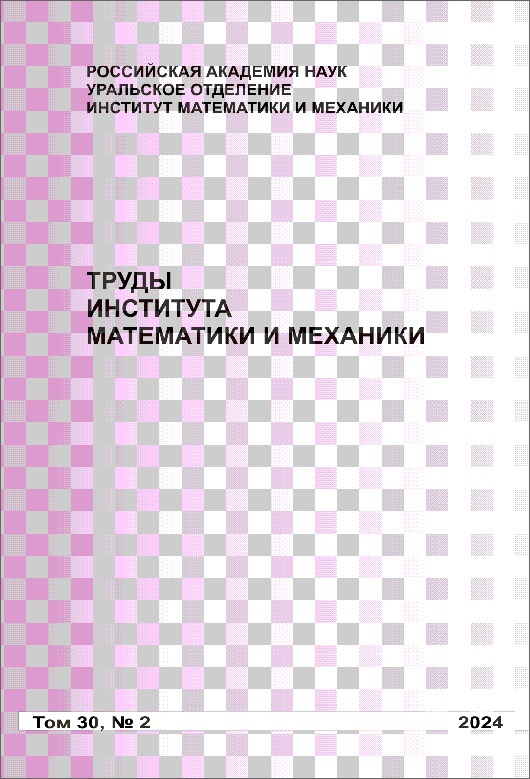|
This article is cited in 2 scientific papers (total in 2 papers)
On Kolmogorov type inequalities in the Bergman space for functions of two variables
M. Sh. Shabozova, V. D. Sainakovb
a Tajik National University, Dushanbe
b Tajik Technological University
Abstract:
Suppose that $\mathrm{z}:=(\xi,\zeta)=(re^{it},\rho e^{i\tau})$, where $0\leq r,\rho<\infty$ and $0\leq t,\tau\leq 2\pi$, is a point in the two-dimensional complex space $\mathbb{C}^{2}$; $U^{2}:=\{\mathrm{z}\in\mathbb{C}^{2}: |\xi|<1,\,|\zeta|<1\}$ is the unit bidisk in $\mathbb{C}^{2}$; $\mathcal{A}(U^{2})$ is the class of functions analytic in $U^{2}$; and $B_{2}:=B_{2}(U^{2})$ is the Bergman space of functions $f\in\mathcal{A}(U^{2})$ such that
$$ \|f\|_{2}:=\|f\|_{B_{2}(U^{2})}=\left(\frac{1}{4\pi^{2}}\iint_{(U^{2})}|f(\xi,\zeta)|^{2}d\sigma_{\xi}d\sigma_{\zeta}\right)^{1/2}<+\infty, $$
where $d\sigma_{\xi}:=dxdy$, $d\sigma_{\zeta}:=dudv$, and the integral is understood in the Lebesgue sense. S.B. Vakarchuk and M.B. Vakarchuk (2013) proved that, under some conditions on the Taylor coefficients $c_{pq}(f)$ in the expansion of $f(\xi,\zeta)$ in a double Taylor series, the following exact Kolmogorov inequality holds:
$$ \left\|f^{(k-\mu,l-\nu)}\right\|_{2}\leq \mathcal{C}_{k,l}(\mu,\nu) \,\|f\|_{2}^{\mu\nu/(kl)}\,\left\|f^{(k,0)}\right\|_{2}^{(1-\mu/k)\nu/l}\,\left\|f^{(0,l)}\right\|_{2}^{(1-\nu/l)\mu/k}\,\left\|f^{(k,l)}\right\|_{2}^{(1-\mu/k)(1-\nu/l)}, $$
where the numerical coefficients $\mathcal{C}_{k,l}(\mu,\nu)$ are explicitly defined by the parameters $k,l\in\mathbb{N}$ and $\mu,\nu\in\mathbb{Z}_{+}$. We find an exact Kolmogorov type inequality for the best approximations $\mathscr{E}_{m-1,n-1}(f)_{2}$ of functions $f\in B_{2}(U^{2})$ by generalized polynomials (quasipolynomials):
$$ \mathscr{E}_{m-k+\mu-1,n-l+\nu-1}\big(f^{(k-\mu,l-\nu)}\big)_{2} $$
$$ {}\leq\frac{\alpha_{m,k-\mu}\alpha_{n,l-\nu}(m-k+1)^{(k-\mu)/(2k)}(n-l+1)^{(l-\nu)/(2l)}(m+1)^{\mu/(2k)}(n+1)^{\nu/(2l)}}{(\alpha_{m,k})^{1-\mu/m}(\alpha_{n,l})^{1-\nu/l}\left[(m-k+\mu+1)(n-l+\nu+1)\right]^{1/2}} $$
$$ {}\times\big(\mathscr{E}_{m-1,n-1}(f)_{2}\big)^{\frac{\mu\nu}{kl}}\big(\mathscr{E}_{m-k-1,n-l}\big(f^{(k,0)}\big)_{2}\big)^{(1-\frac{\mu}{k})\frac{\nu}{l}} $$
$$ {}\times\big(\mathscr{E}_{m-1,n-l-1}\big(f^{(0,l)}\big)_{2}\big)^{\frac{\mu}{k}(1-\frac{\nu}{l})}\big(\mathscr{E}_{m-k-1,n-l-1}\big(f^{(k,l)}\big)_{2}\big)^{(1-\frac{\mu}{k})(1-\frac{\nu}{l})} $$
in the sense that there exists a function $f_{0}\in B_{2}^{(k,l)}$ for which the inequality turns into an equality.
Keywords:
Kolmogorov type inequality, Bergman space, analytic function, quasipolynom, upper bound.
Received: 03.07.2018
Revised: 19.10.2018
Accepted: 22.10.2018
Citation:
M. Sh. Shabozov, V. D. Sainakov, “On Kolmogorov type inequalities in the Bergman space for functions of two variables”, Trudy Inst. Mat. i Mekh. UrO RAN, 24, no. 4, 2018, 270–282
Linking options:
https://www.mathnet.ru/eng/timm1592 https://www.mathnet.ru/eng/timm/v24/i4/p270
|

| Statistics & downloads: |
| Abstract page: | 181 | | Full-text PDF : | 59 | | References: | 34 | | First page: | 3 |
|




 Contact us:
Contact us: Terms of Use
Terms of Use
 Registration to the website
Registration to the website Logotypes
Logotypes








 Citation in format
Citation in format 
